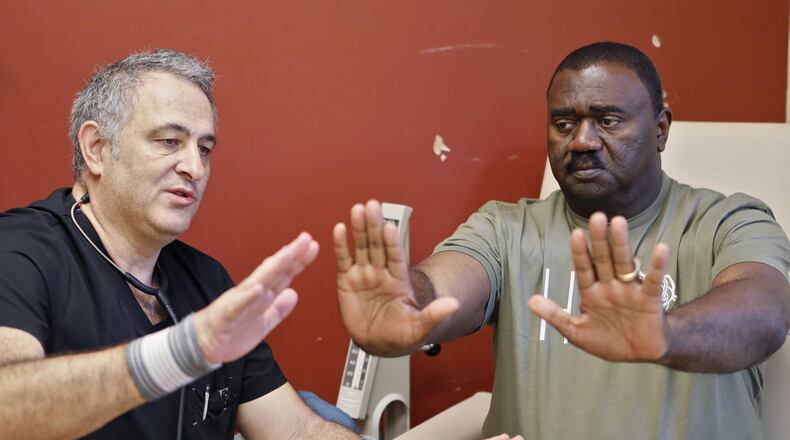Willie Blackwell needs a kidney. If he doesn’t get one soon, doctors say, he could die.
The news didn't come as much of a surprise for the former NFL player. Blackwell, who played for Washington, Buffalo and Kansas City, has known he'd need a kidney one day now for the past 20 years.
In 1999, when he started experiencing sharp persistent pain in his left side, doctors ran a series of tests and discovered the McDonough father of three had kidney cancer, among the 10 most common cancers in both men and women.
How common?
This year alone, more than 73,000 people will be diagnosed with kidney cancer in the U.S., according to the American Cancer Society.
Soon after the diagnosis, doctors removed the diseased kidney, and Blackwell got on with his life. He made a few lifestyle changes, forgoing red meat for a mostly vegetarian diet, and his right kidney seemed to be working just fine.
Then during a routine checkup back in January, doctors made another discovery.
Blackwell’s remaining kidney was operating at only 15%. That’s significant because most people whose kidneys are performing at 25% are on dialysis.
“Everybody says I’m a walking miracle,” Blackwell told me.
Yep, it looks that way.
RELATED: Trump effort to tackle kidney disease could have big impact on Georgia
Less than a month ago, President Donald Trump signed an executive order that would promote organ donations and reshape kidney care. That’s not all. Other goals include reducing the number of Americans developing end-stage renal disease by 25% by 2030, and by 2025 to have 80% of all newly diagnosed patients either receiving a transplanted kidney or getting dialysis at home.
Blackwell is already “terribly weak.”
Rather than go on dialysis, he has opted to continue working part time because he likes talking. That’s about 80% of car selling, which is what he has been doing for a living since retiring in 1994.
“It keeps my mind off the negative,” he said.
To date, most of his family members, including his wife, son and daughters, have been tested to see if they are a match, but none meet the donor criteria. Most have health issues of their own, which automatically disqualifies them.
Last month, the transplant coordinator notified him she’d found a match, but that fell through, too.
Even so, Blackwell is hopeful.
RELATED: Can this cross-country trek increase organ donations?
When he found out his only kidney was failing, his initial thought was he was going to die. He quickly regrouped, remembering his walk with God and his complete faith in him.
“I kept telling the Lord I’d been faithful, didn’t that count for something,” he said.
Credit: The Atlanta Journal-Constitution
Credit: The Atlanta Journal-Constitution
Blackwell, who’s been married for 38 years to his wife, Kathy, took great pride in being a faithful husband, a good father and, after leaving football to become an account executive with a food service company, a loyal employee. He’d served as a volunteer chaplain at both Morris Brown, his alma mater, and Clark Atlanta University. He was an avid volunteer in his church and community.
In 1995, Gov. Zell Miller gave Blackwell a top Literacy Award for his volunteer literacy services at Dobbs International Food Service — now called Gate Gourmet Food Service. He started a GED, ESL and reading program for Gate Gourmet employees so they could improve their literacy skills nationwide.
“When you take care of people, God will take care of you,” he said.
Of the 5,000 Georgians waiting for an organ transplant, more than 90% need a kidney; most are African American.
That’s why it’s so important that blacks become organ donors.
That isn’t to say cross-racial transplants don’t work. They do. That’s why it’s important for all of us to get on the donor list.
There are thousands of people whose very life depends on it — just like Willie Blackwell.
Find Gracie on Facebook (www.facebook.com/graciestaplesajc/) and Twitter (@GStaples_AJC) or email her at gstaples@ajc.com.
TO GET TESTED
Log onto piedmontlivingdonor.org, scroll down to "Heroes Start Here" and click on Start Now.
Once completed, the Medical History Questionnaire will be submitted to a Piedmont Living Donor Coordinator for review. They will call to let you know if you are a donor candidate, review the donor evaluation process and answer any questions you may have.
About the Author
Keep Reading
The Latest
Featured





